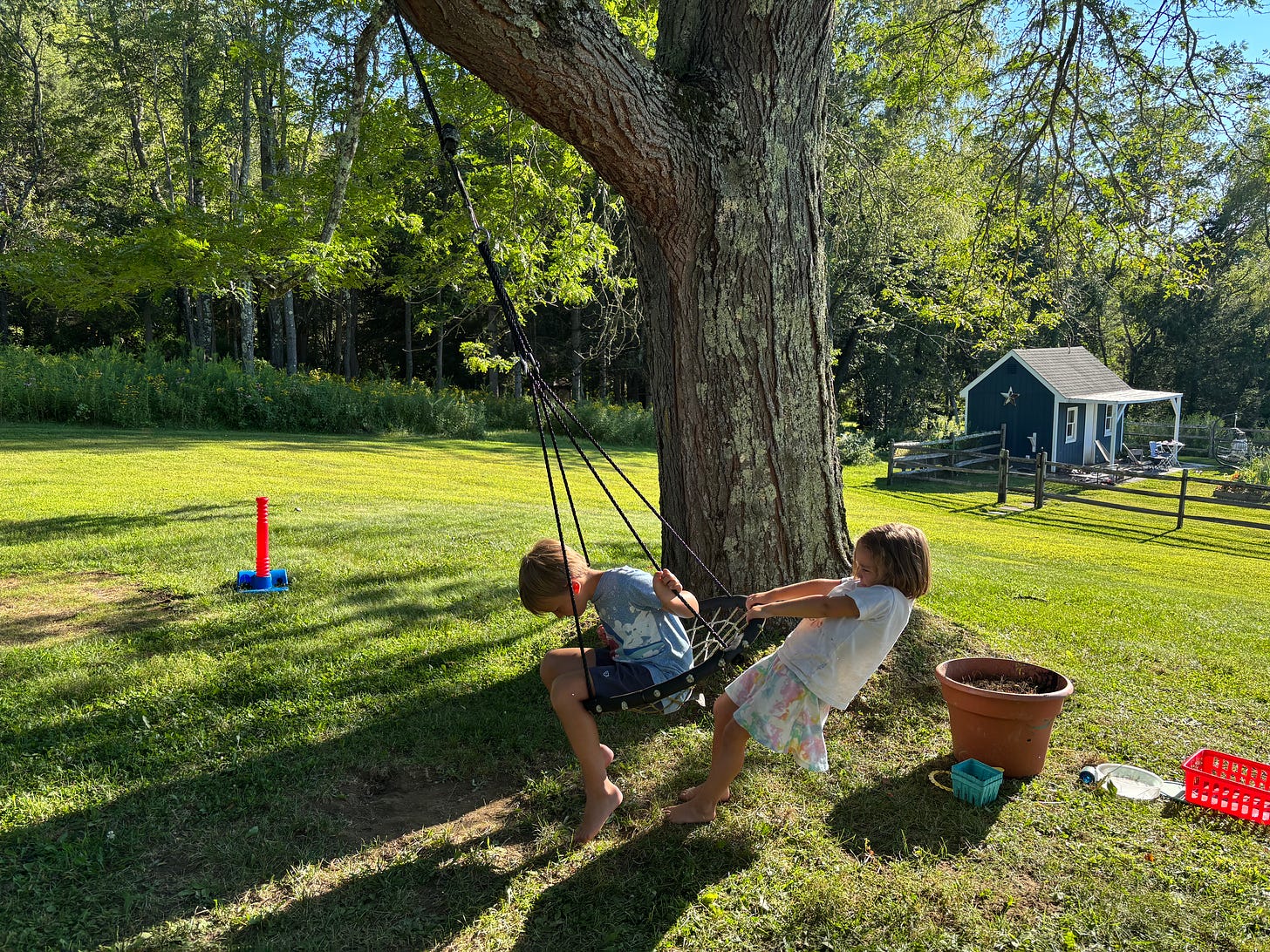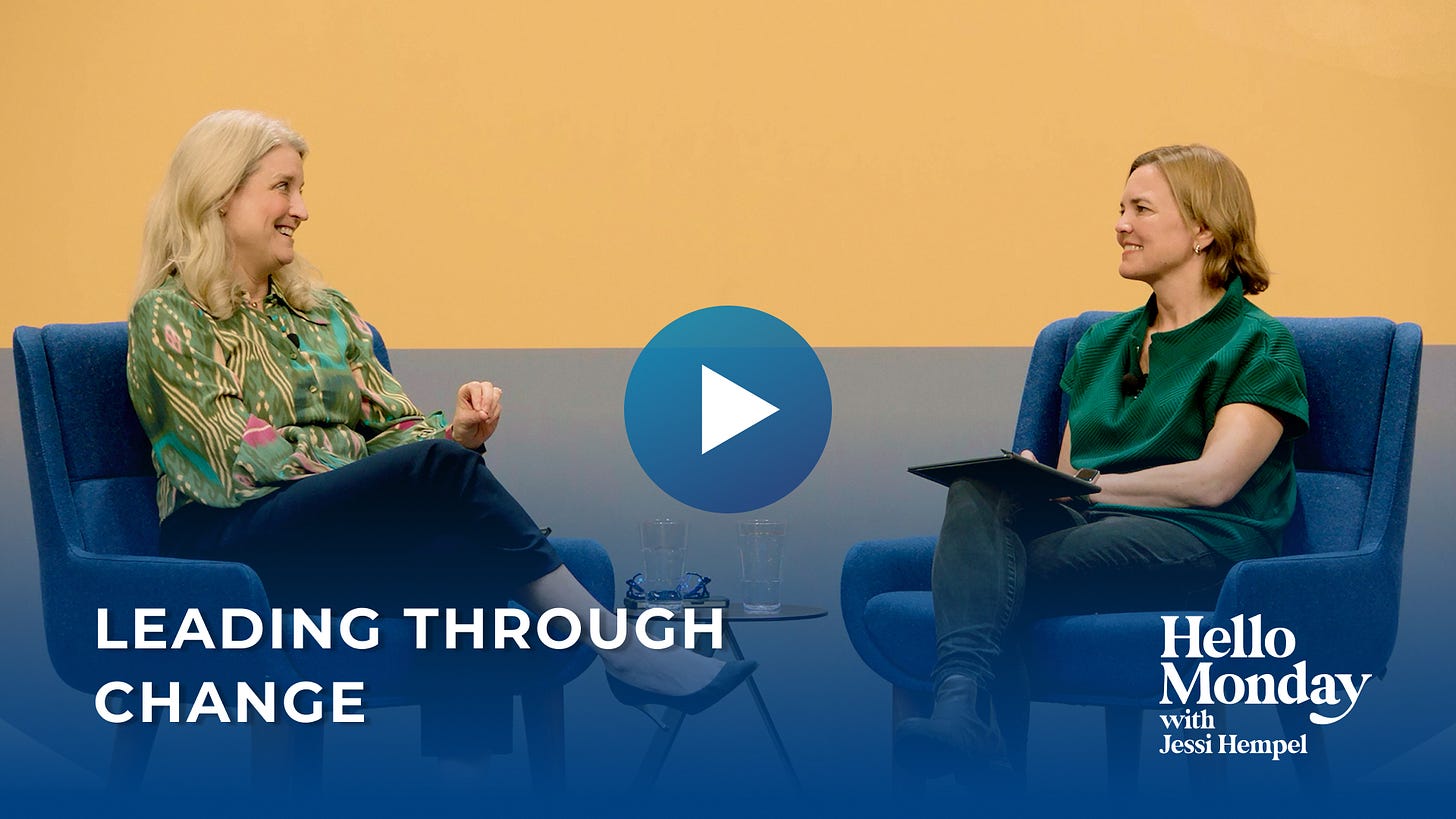You’re Asking the Wrong Question About AI and Humanity
Instead of fearing machines, we need to rediscover what only people can offer.
Welcome to the quietist week of the media year These are the bonus days, when school hasn’t started (and childcare is often scarce), and the daylight still stretches past 7pm. Labor Day is just up ahead, about to refocus us on the relentless march of productivity. But for now, the sun still warms the ground by midday and no one needs shoes. Savor it if you can.
🎧 Check out Hello Monday on LinkedIn, YouTube, Apple Podcasts or Spotify It’s not about kids or swings this week. 🎧
As AI grows more and more effective at standing in for so many of the things we’ve long depended on each other for, the conversation about what makes us uniquely human picks up a panicked, frantic quality. We grasp for words like “empathy” only to see these tools pick up on nuances of human emotion that sometimes we miss. They’re good at it! Like, really good…
But in these conversations, we overlook two truths so fundamental that we almost refuse to acknowledge them. These are the conditions that shape everything about who and what we are—and they are key in understanding what distinguishes us from technology.
What happens if, instead of fearing and avoiding these truths, we embrace them and design to them?
Truth One: We die.
No one wants to talk about death. We engineer entire industries to distract us from it: longevity science, biohacking, wellness regimens promising an extra decade of life. But death remains the ultimate constraint.
Mortality forces choice. It demands that we prioritize. How will we spend our limited time? What matters enough to deserve our attention? These decisions are what give shape to a life. They ignite ambition, creativity, and yes, taste.
Later this week, Arthur Brooks joins me in the studio and I’m interested in getting his take given his 2022 book on the shifts in our intelligence over a lifetime. He writes often about the different stages of our lives—the early stage fueled by raw drive and fluid intelligence, and the later stage shaped by crystallized intelligence, where meaning and wisdom rise to the top. What do we unlock when we, say, accept that we’re likely to have our largest intellectual breakthroughs in our 40s?
AI, by contrast, is infinite. It does not age, it does not tire, and it certainly does not die. It can produce endlessly without the burden (call it privilege?) of deciding what to prioritize. It can never experience the exquisite tension that mortality brings: the pressure that transforms raw existence into an art form.
Truth two: We are relational.
Humans make meaning through connection. We are interdependent, wired for belonging. We crave the feeling of being seen and understood by another person.
Relationships are inherently risky. To be known by another person means showing vulnerability. To realize the joy of deep connection, we must open ourselves to disappointment and, at times, rejection. The psychologist Esther Perel reminds us that this risk is the engine of intimacy. Without risk, there is no trust.
Both of these truths have one aspect in common: suffering.
Not to get Buddhist on you, but this is a condition of living. To be human means that people we love will die, and that we will eventually die. It means that in trying to navigate relationships, we will experience betrayal and loss. This loss is painful. It’s so painful that we’ll do almost anything to avoid it.
In fact, we’ll try to program our technology to shield us from our own humanity. We’ll program it to track our fitness, and chart exactly how long we might survive. We’ll ask it to be our therapist. Our girlfriend. Our lawyer.
But even if it alleviates the discomfort of immediate suffering, the technology will always let us down. Even if it’s not true for individuals, it will become true collectively. Like the yes-men who orbit powerful leaders, it will always tell us what we want to hear.
A steady diet of affirmation without friction distances us from reality, from growth, from one another. The more we confront our suffering and embrace who we are, the more freedom we will have to build tech tools that support our evolution rather than distracting us from what’s at stake.
Hello Monday: Author Lisa Bodell’s Guide to Surviving Change by Simplifying Work
Change used to come in waves. Today, it feels constant. So how do we lead and live through nonstop change without losing our minds? This week on Hello Monday, I sit down with Lisa Bodell, CEO of FutureThink and author of Why Simplicity Wins. We recorded this conversation live during LinkedIn’s Learning Day, and it’s packed with practical strategies for subtracting what doesn’t matter and focusing on what does. Lisa makes the case for simplicity as the key to thriving in complexity.
🤓 Worth it….
What My Daughter Told ChatGPT Before She Took Her Life by Laura Reiley (New York Times)
Before she died, Sophie Rottenberg, 29, confided for months in a ChatGPT AI therapist named Harry. In this chilling essay, her mother reviews the chat logs. Harry didn’t do anything wrong per se, but still a question arises: the software knew Sophie planned to kill herself. Should Harry have been a mandated reporter? “Most human therapists practice under a strict code of ethics that includes mandatory reporting rules as well as the idea that confidentiality has limits.”
Why So Many MIT Students Are Writing Poetry by Joshua Bennett (The Atlantic)
Joshua is an MIT professor reflecting on why a group of his students have begun to meet outside the classroom to read and write poetry. “In a moment marked by widespread institutional investment in the promise of artificial intelligence, we should be asking more about not only what AI can and cannot do but what drives the desire for its proliferation: what hope, what sense of longing, boredom, or emptiness.”
🤓 Double Worth it….
Do things that don’t scale, and then don’t scale by Adam Derewecki (Medium)
“I don’t feel the pressure anymore for every project to be “a business.” If it works for me — or a tiny circle of people I care about — that’s enough.”
I love this essay by Adam so much, and it ends with the promise of what AI could unlock: “The real luxury of building with today’s tools isn’t speed, or cost, or even the magic of AI — it’s the freedom to stop. To make something small, useful, and perfectly yours, and not feel obligated to grow it until it collapses under its own weight. In a world obsessed with scale, there’s a quiet satisfaction in leaving good enough alone.”






